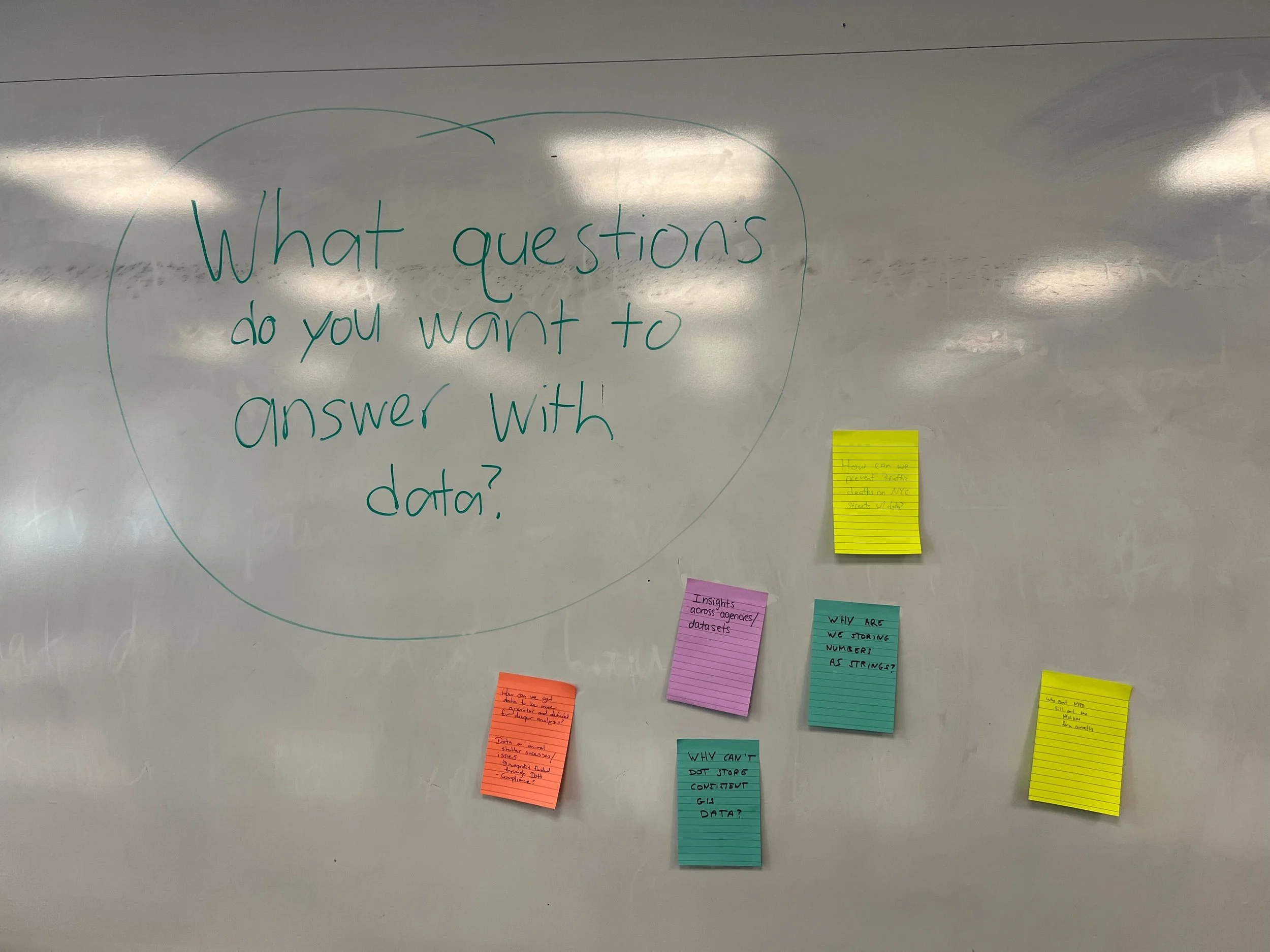Why Civic Data Matters: 5 Lessons From BetaNYC’s CityCamp
We first connected with BetaNYC at this year’s School of Data, where their mission to make civic data accessible deeply resonated with us. BetaNYC is an organization dedicated to improving access to information, technology, and data through community-driven initiatives.
That’s why we chose to sponsor CityCamp by funding childcare to make the event more inclusive and by hosting a Data Matchmaking workshop. In this blog, I’ll share what we learned from CityCamp, the challenges of civic data accessibility, silos teams are facing, and how collaboration can move civic tech forward.
What is CityCamp?
CityCamp is a full-day “unconference” bringing together New York City’s civil society, government, and data enthusiasts.
Attendees co-create the agenda, designing interactive workshops that surface challenges and solutions for the NYC open data ecosystem.
What We Learned
At CityCamp, we hosted a workshop called Data Matchmaking. The idea was simple: connect people with the datasets and questions that mattered most to them. Our workshop gave us a front-row seat to the frustrations and opportunities New Yorkers face when working with civic data. As participants shared the datasets they had used and the questions they wanted to answer, several common pain points emerged.
We divided the group into two by their responses to which NYC datasets they had worked with, and what questions they wished they could answer. From there, each group then brainstormed three “wishlist” changes they wanted to see in NYC’s data landscape. Finally, we sent participants off with the challenge to begin implementing those ideas. The energy in the room was collaborative and hopeful, a reminder of how powerful community-driven exploration can be.
The result of our workshop? A front-row seat to recurring frustrations with NYC civic data and beginning to plant the seeds for possible solutions. Here’s what we learned:
1. Data discovery is difficult
Finding NYC civic data is difficult- attendees said there are too many portals, with no clear path to the right dataset. Even when they find data, it is often hard to interpret.
Wishlist:
Better documentation for every dataset field
A centralized, searchable portal instead of fragmented silos
A showcase of projects so users can learn from one another
Discoverability is the first barrier to civic data use. The gap here is between what people are getting (disorganized, under-documented datasets) and what they need (clear, centralized, well-documented sources). We believe NYC needs a more unified pipeline that lowers the barrier for discovery and gives users a space to share how they have worked with the data.
2. Data quality is inconsistent
Participants shared frustrations with outdated, incomplete, or outright incorrect data. One example: missing GIS information that defaults to “0,0” in Africa, which creates noise in analyses.
Wishlist:
City-wide GIS standards
Inter-agency consistency in reporting
Fixes for duplicated or broken geometry in mapping files
This is an accountability problem. Agencies often lack incentives to fix these errors, so flawed datasets persist. Clear data quality standards, paired with automated monitoring and community feedback loops, would build trust and improve usability.
3. Usability is a barrier
Even when civic datasets are technically available, they are not always accessible to non-experts. Attendees noted the lack of standard formats, inconsistent segmentation (e.g., LION vs. centerline), and overly technical structures.
Wishlist:
Standardized, user-friendly documentation
Examples of common use cases
Training resources for community members
Data needs to meet people where they are. Civic data should not just be open but usable. Consistent formatting, field-level documentation, training resources and human-centered design can expand the impact of NYC’s data initiatives.
4. Accountability is weak
Agencies release datasets, but there are often no clear incentives or structures that ensure agencies maintain them. This has created a cycle where flawed datasets linger and trust erodes because no one is directly responsible for fixing it.
Wishlist:
Clear ownership of datasets
Accountability frameworks that tie data quality to agency performance
Public reporting on improvements or issues
We envision a stronger feedback pipeline between the people who rely on data and the agencies that produce it. Accountability is more than just fixing errors, it’s about creating the right incentives and governance to prevent them in the first place. Establishing transparent ownership, clear standards, and mechanisms for feedback would give both agencies and the public more confidence in NYC’s data infrastructure.
5. Collaboration is limited
CityCamp showed us how many people are working on similar civic data projects, often in isolation. Without a central way to coordinate, promising work risks being duplicated or left unfinished.
Wishlist:
Shared platforms to showcase active and unfinished projects
Visibility into overlapping efforts
Tools to connect organizations tackling similar challenges
This is a problem of silos. The civic tech community needs a collaboration layer of platforms that can highlight ongoing work, encourage open contribution, and reduce duplication.
Why This Matters
These pain points highlight why events like CityCamp matter. They surface shared challenges that are not unique to New York City and represent the broader issues civic data communities face nationwide. CityCamp reinforced why solving them requires both community energy and technical expertise, showing how much potential there is when people come together to make data more accessible and impactful.
The main takeaways are clear:
Access remains a challenge, with barriers in discoverability, quality, and usability
Agencies need stronger incentives to improve the data they release
Collaboration is essential, because too many people are working in silos on similar problems
For the Database Tycoon team, CityCamp was more than a one day event. It was a reminder of why we show up: to help make data more accessible, to support inclusive spaces, and to stand as pillars in a community that believes better data leads to a better city.
Take Action with Database Tycoon
If your organization is struggling with fragmented datasets, poor data quality, or siloed collaboration, we can help. At Database Tycoon, we specialize in:
Building unified data pipelines
Establishing data quality and governance standards
Designing collaboration frameworks for civic tech and nonprofits
Making complex datasets usable for both technical and non-technical audiences
Take our Data Maturity Quiz to see where your organization stands and discover which data service will have the biggest impact on your business.
Database Tycoon CEO & Founder Stephen Sciortino and Account Manager, Chloe Anderson at CityCamp NYC




